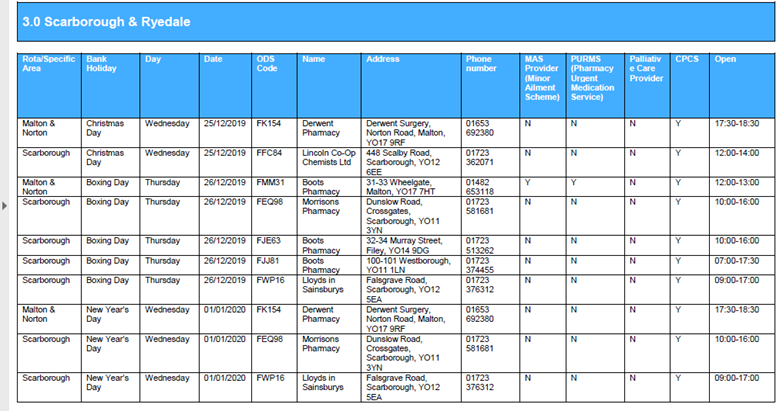News and information
Visitors urged to keep flu out of hospital
Visitors to hospitals in North and East
Yorkshire are being urged to help protect patients and staff by reducing the
spread of flu and other illnesses which are commonly associated with winter.
Flu, short for influenza, is a common
infectious viral illness spread by coughs and sneezes. It can prove fatal for
vulnerable people, with those aged 65 and over and with long-term health
conditions, including diabetes and kidney disease, particularly at risk.
At this time of year, a rise in the
numbers of cases of rotavirus and diarrhoea bugs is also common and these can
be equally disruptive if there is an outbreak in a hospital or other healthcare
setting.
York Teaching Hospital NHS Foundation
Trust, which runs Scarborough Hospital, says there had been a number of
confirmed flu cases on the wards over the last few weeks which had led to some
bays being closed, putting beds out of action at a time of year when they are
most in demand.
Heather McNair, Chief Nurse at York
Teaching Hospital NHS Foundation Trust said: “We are asking people who have
been unwell with symptoms of flu not to visit the hospital until they have been
free of symptoms for at least two days. This is really important because the
virus is highly infectious and outbreaks can happen quickly.
“We ask that people think carefully
before paying any non-essential visits, and to keep hands clean and be vigilant
about hand washing. This is to keep the virus contained and to help visitors
keep themselves safe as well as their friends or relatives.”
Dr Charles Parker, who will become the
Clinical Chair of North Yorkshire Clinical Commissioning Group (CCG) when the
CCGs in Scarborough and Ryedale, Hambleton, Richmondshire and Whitby, and
Harrogate and Rural District are disestablished at the end of March next year,
added: “An outbreak of flu or norovirus in hospitals and other healthcare
settings can have serious consequences, both for patients who may already very
unwell, and on the hospital space that’s available to look after people.
“When there is an outbreak of flu or
another infection, it’s important this can be contained, but it may mean bays
and sometimes entire wards are quarantined and are not available.”
Hospital visitors are asked to:
- Stay away if they have signs or symptoms of the infection. Some of the main symptoms of flu include:
– a high temperature (fever) of 38C (100.4F) or above
– tiredness and weakness
– a headache
– general aches and pains
– a dry, chesty cough - Cold-like symptoms – such as a blocked or runny nose, sneezing, and a sore throat – can also be caused by flu, but they tend to be less severe than the other symptoms you have.
- Think carefully before paying any non-essential visits at this time
- Keep hands clean and be vigilant about hand washing.
- Respect the fact that if a ward is closed due to the virus, this also applies to visitors. There are exceptions to this, and the ward sister can advise visitors if they feel they have exceptional circumstances.
You can protect yourself, your family
and other patients by getting yourself vaccinated. The flu vaccination is available
every year to help protect adults and children at risk of flu and its
complications.
The injected flu vaccine is offered
free on the NHS annually to:
- adults over the age of 18 at risk of
flu (including everyone aged 65 and over) - pregnant women
- children aged six months to two years
at risk of flu
Many pharmacies also offer the flu
vaccination.
Scarborough and Ryedale Pharmacy opening hours – Christmas and New Year
North Yorkshire Clinical Commissioning Groups back World Antibiotics Awareness Week campaign
NHS Hambleton Richmondshire and Whitby, NHS Harrogate and Rural District and NHS Scarborough and Ryedale Clinical Commissioning Groups (CCGs) are backing a national campaign which aims to increase awareness of antibiotic resistance.
The campaign known as ‘World Antibiotics Awareness Week’ will run from 18 to 22 November targeting the general public, health workers and policy makers to improve awareness and understanding of antibiotic resistance through effective communications, education and training.
Speaking on behalf of the three clinical commissioning groups in North Yorkshire, Dr Tim Rider, GP Prescribing Lead, said: “Taking antibiotics inappropriately encourages harmful bacteria that live inside you to become resistant. That means that antibiotics may not work when you really need them. This puts you and your family at risk of a more severe or longer illness.
“If you or a family member has a cold or flu, antibiotics probably aren’t the answer, ask your pharmacist to recommend medicines to help with the symptoms or pain, they are experts in minor illnesses.
“Antibiotics are needed for serious bacterial infections such as sepsis, pneumonia, urinary tract infections, meningococcal meningitis and sexually transmitted diseases. If you are worried you may have something more serious than a cold or flu, speak to your doctor who will be able to advise you on the best treatment option.”
With no new antibiotics developed in the last 30 years patients are encouraged only to take them if they need to. Taking them unnecessarily could make them less effective when fighting serious infections.
Without the effectiveness of antibiotics, routine operations like hip replacements, organ transplants and caesarean sections or chemotherapy treatments will become increasingly dangerous or impossible.
Patients can support the campaign by becoming an ‘Antibiotic Guardian’ at: https://antibioticguardian.com/
More information on the campaign can be found on the World Health Organisation website: https://www.who.int/campaigns/world-antibiotic-awareness-week
Read MoreNew programme launched to prevent abusive head trauma injuries to babies
The ICON programme has been initially funded by the four North Yorkshire Clinical Commissioning Groups (CCGs) and delivers four simple messages before the birth and in the first few months of a baby’s life which will be communicated by Midwifery and Health Visitor services :
I – Infant crying is normal;
C –Comforting methods can help;
O – It’s OK to walk away;
N – Never, ever shake a baby.
These ICON messages have been demonstrated to help parents and carers manage the stresses which can be caused by normal infant crying. Midwives, Health Visitors and other professionals across the region have developed ICON expertise to help give parents and carers the tools they need to help keep their babies safe. They have also produced an information graphic around infant crying which can be found here.
Merger approved for three North Yorkshire Clinical Commissioning Groups
NHS England has approved the merger of three North Yorkshire clinical commissioning groups (CCGs). The three CCGs – NHS Hambleton, Richmondshire and Whitby CCG, NHS Harrogate and Rural District CCG and NHS Scarborough and Ryedale CCG – will become the North Yorkshire Clinical Commissioning Group on 1 April 2020.
We welcome NHS England’s decision and the benefits it will bring to the people of North Yorkshire.
As a single organisation we will be able to:
- Eliminate unnecessary duplication and bureaucratic boundaries to work more efficiently together and with our partners.
- Ensure consistency of decision making for the people of North Yorkshire.
- Develop a unified approach to relationships with the new North Yorkshire Primary Care Networks.
- Provide a more agile and responsive service which maintains a local focus but enables us to obtain better value for money by commissioning at scale.
- Reduce administrative costs to enable more investment in front line health services.
- Share good practice and adopt the best from each of the three existing CCGs.
- Speak as a unified commissioning voice for the benefit of our local population.
- Work more strategically on a larger footprint with our local and regional partners.
This merger follows reviews carried out by each of the three North Yorkshire CCGs last year and builds on work already started to improve the way that the CCGs work together and deliver for local people. A single leadership team has already been appointed, following decisions by each CCG’s governing body in summer 2018, and we have already begun to look at how best to structure the new organisation.
Charles Parker, GP and Chair Designate of the North Yorkshire CCG said: “The North Yorkshire CCG will retain the existing commitment to strong clinical leadership and focus on the needs of local people, drawing in best practice from learning across North Yorkshire. The governance model we have developed will still allow there to be strong local leadership and patient engagement, ensuring each area of North Yorkshire will continue to have a strong clinical voice and patients’ views are represented.”
Amanda Bloor, Accountable Officer for the three North Yorkshire CCGs said: “A single commissioning voice will make it easier to reduce some of the health inequalities we see across the county and respond consistently to the needs our population. The merger also will enable us to work more efficiently and at scale freeing up resources to invest in front line health services.”
Work will continue in the months ahead with the community, staff and partners to further develop the North Yorkshire CCG before it begins operations on 1 April 2020. This will include beginning operations in shadow form from the beginning of the new year and developing our operational plan for our first year as well as longer term strategies to guide the work of the new organisation.
Read More

